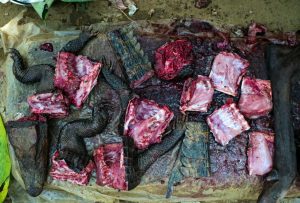
An alarming report about illegal chimpanzee meat being served at British weddings and sold on market stalls, has shocked Londoners and may also concern tourists, following accounts of similar illicit “bushmeat” being dished up in restaurants.
Leading primate scientist Dr Ben Garrod told London’s Daily Mirror that over the past month, a tonne of chimpanzee flesh – known as bushmeat – has been confiscated by Customs as it came into the UK from West Africa.
Chimps are endangered – and as they are genetically similar to humans, the meat can cause serious disease. The lethal disease Ebola, for instance, is even more deadly for gorillas and chimpanzees than it is for humans, with mortality rates approximately 95% for gorillas and 77% for chimps.
Estimates a few years ago suggested that a third of the world’s gorillas and chimpanzees have died from Ebola since the 1990s. Meera Inglis, who holds a PhD in Conservation Policy from the University of Sheffield, has called Ebola the single greatest threat to the survival of gorillas and chimpanzees.
Diseases can jump the species barrier in both directions. An Ebola outbreak (among humans) in the Congo, which began last year, spread this week to neighbouring Uganda, placing new pressure on the World Health Organisation (WHO) to declare the outbreak – the second-deadliest in history – a global health emergency.
Ever since researchers sequenced the chimp genome in 2005, they have known that humans share about 99% of our DNA with chimpanzees, making them our closest living relatives.
Western chimpanzees have been placed on the critically endangered species list because of threats to their environment – and because people are killing them for their meat, which some Africans consider a delicacy.
As Robert Young, Professor of Wildlife Conservation at the University of Salford pointed out: “Much of the modern bushmeat trade is no longer connected to native people needing to exploit wildlife as a food resource, but the descendants of these people who have developed a taste for the food. It is for this reason that several hundred tonnes of bushmeat enter Europe each year, where its illegality has made it a status symbol in some sections of society.”

Chimpanzees share about 99% of our DNA
The issue of illegal meat being imported into Europe is not new. During a 17-day period in 2010, 134 passengers from 29 flights from suspect countries were searched coming into Charles de Gaulle airport in Paris.
Almost half were found to be carrying fish or meat from livestock or wild animals including crocodiles, primates and porcupines.
The banned African delicacy, “smokies” (sheep and goat heads cooked with a blowtorch) seems almost wholesome compared to some of the other fare on offer. Some years ago, a Nigerian couple were jailed for four months in London for selling monkey steaks, chimpanzee hands and flesh from lions, antelopes, porcupines, anteaters and cane rats, along with large, live snails – all smuggled in from West Africa.
A subsequent investigation by Britain’s Observer newspaper revealed that illegal bushmeat such as monkey, elephant, warthog, porcupine and rat was being sold – often openly – in shops and restaurants throughout Britain.

What’s for dinner? Crocodile and antelope
The meat is often packaged in unsanitary conditions – and if the Mirror’s report of a few days ago is correct, the situation doesn’t seem to have changed.
Written by Peter Needham















